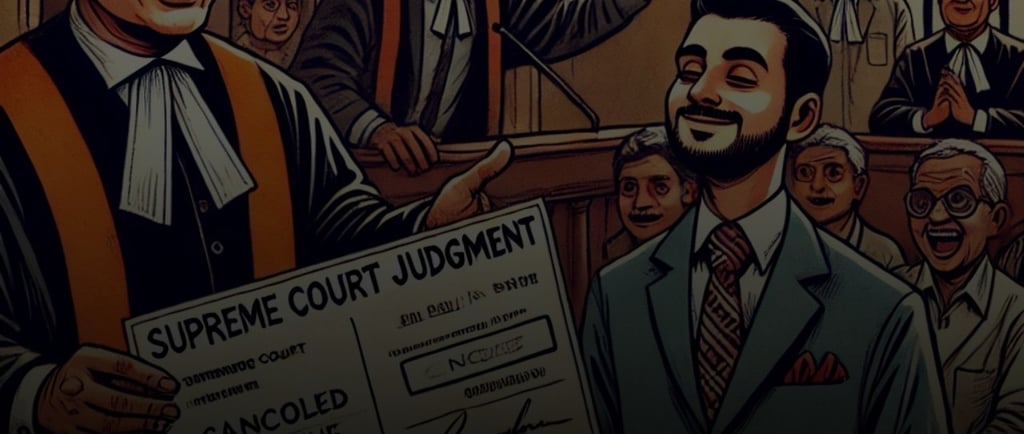Supreme Court Quashes Cheque Bounce Case Against Businessman Amid Insolvency Proceedings
The Supreme Court of India has quashed criminal proceedings against Vishnoo Mittal, a director of Xalta Food and Beverages Pvt. Ltd., in a case under Section 138 of the Negotiable Instruments Act, 1881. The case arose after cheques issued to M/s Shakti Trading Company bounced due to insufficient funds.
3/19/20252 min read


The Supreme Court of India has quashed criminal proceedings against Vishnoo Mittal, a director of Xalta Food and Beverages Pvt. Ltd., in a case under Section 138 of the Negotiable Instruments Act, 1881. The case arose after cheques issued to M/s Shakti Trading Company bounced due to insufficient funds. The legal battle, which started in 2018, questioned whether the moratorium under Section 14 of the Insolvency and Bankruptcy Code (IBC), 2016, could provide relief to individuals associated with a corporate debtor.
Events Leading to the Case
Mittal had issued 11 cheques amounting to ₹11,17,326 to M/s Shakti Trading Company in his capacity as a director. When the cheques were dishonored on July 7, 2018, the respondent issued a legal notice on August 6, 2018. Meanwhile, on July 25, 2018, insolvency proceedings were initiated against Xalta Food and Beverages Pvt. Ltd., and a moratorium was imposed under Section 14 of the IBC.
Following the non-payment of dues within the statutory period, M/s Shakti Trading Company filed a complaint under Section 138 of the NI Act in September 2018. The trial court issued summons to Mittal on September 7, 2018. Mittal approached the Punjab and Haryana High Court seeking the quashing of the case under Section 482 of the CrPC, citing the moratorium under the IBC. However, the High Court dismissed his plea on December 21, 2021.
Key Legal Arguments
Mittal argued that the moratorium imposed under the IBC on July 25, 2018, prevented proceedings against him, as the cheques were dishonored before the insolvency process began but the legal notice was issued after. According to him, since the moratorium was in effect, criminal prosecution under the NI Act should not have been allowed.
The High Court relied on the Supreme Court’s judgment in P. Mohan Raj v. M/S Shah Brothers Ispat Pvt. Ltd. (2021), which held that the moratorium under the IBC protects only the corporate debtor and not individuals such as directors. Thus, the High Court dismissed Mittal’s petition, leading to an appeal in the Supreme Court.
Supreme Court’s Observations
The Supreme Court, in its March 17, 2025, judgment, disagreed with the High Court’s reliance on P. Mohan Raj. The apex court noted that in P. Mohan Raj, the cause of action under Section 138 of the NI Act had arisen before the moratorium was imposed. However, in Mittal’s case, the cause of action (which includes the demand notice and non-payment within 15 days) occurred after the moratorium had already been imposed.
The Supreme Court emphasized that under Section 17 of the IBC, once insolvency proceedings commence, the management of the corporate debtor is taken over by an interim resolution professional (IRP), and the powers of directors are suspended. This meant that Mittal was no longer in control of the company’s finances when the demand for payment was made.
Final Ruling
Recognizing these distinctions, the Supreme Court ruled in favor of Mittal, stating that the High Court had erred in applying P. Mohan Raj to his case. It set aside the High Court’s order, quashed the summoning order of September 7, 2018, and dismissed the criminal complaint against Mittal.
The ruling reaffirms that corporate insolvency resolution processes under the IBC provide relief not just to corporate debtors but, in certain circumstances, also to individuals associated with them. The judgment is expected to impact similar cases where directors face criminal liability due to the company’s financial distress.
Conclusion
With this judgment, the Supreme Court has provided significant clarity on the interplay between the NI Act and the IBC, reinforcing that insolvency-related protections can extend beyond corporate entities when appropriate. This decision could set a precedent for directors facing prosecution under cheque bounce cases in similar insolvency scenarios.
